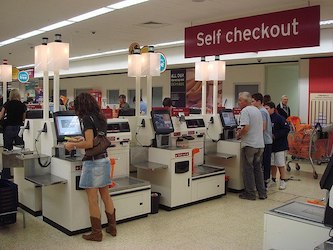Booths, a supermarket chain in northern England, has decided to get rid of self-service tills in almost all of its stores. This decision comes after hearing from customers who said they prefer having staff at the checkouts. Booths is the first UK supermarket to make this change, as self-service tills have become more common in recent years.
The managing director of Booths, Nigel Murray, said that customers have not been happy with the self-scan machines. They have had problems with how fast they work, how reliable they are, and the lack of personal interaction. Also, checking loose items and verifying the age of customers buying alcohol has been a hassle. Booths wants to focus on giving customers a warm, personal experience by having people help them instead of relying on machines.
Booths, often called a northern Waitrose, has always believed in offering the best products in nice stores with great staff. The company is known for giving a friendly welcome and is committed to training its employees to keep up high standards of service. While two stores in the Lake District will keep self-checkouts for busy times, most stores will switch to staffed checkouts.
Self-service checkouts started in the 1990s and have become more common over time. Some shoppers don’t like them because they miss talking to a person. Others like how quick and easy they are. Booths’ decision has gotten mixed reactions from customers. Some are sad to see the self-service tills go, while others are happy to have human interaction back when they shop.
Original news source: Self-service: Booths supermarket puts staff back behind its tills (BBC)
Listen
Slow
Normal
Fast
Group or Classroom Activities
Warm-up Activities:
– News Summary
Instructions: Students will be divided into small groups. Each group will read the article and summarize the key points of the story in their own words. They should aim to create a concise summary within a set time limit (e.g., 5 minutes). Afterward, each group will present their summary to the class, and the class will discuss the various ways the information was interpreted and summarized.
– Opinion Poll
Instructions: The teacher will create a series of statements based on the article’s content (e.g., “Self-service tills are more efficient than staffed checkouts,” “Human interaction is essential in customer service”) and students will move to different areas of the room to show their agreement or disagreement. Students will then pair up with someone of the opposite opinion and discuss their reasons. After the discussion, students can choose to change their position or stay where they are. This will encourage students to use persuasive language and to consider different viewpoints.
– Word Association
Instructions: The teacher writes the word “supermarket” on the board. Students are then asked to call out words they associate with the article’s theme. As students shout out their words, the teacher writes them on the board, creating a web of vocabulary related to the article. Students can then be asked to use some of these words in sentences or a short paragraph to describe their own shopping preferences or experiences with self-service tills.
– Sketch It
Instructions: Provide students with a piece of paper and ask them to draw a scene or concept from the article without using words. For example, they might sketch a self-service till, a staffed checkout, or the Booths supermarket. After a few minutes, have students explain their drawings to a partner and discuss how it relates to the article. This encourages students to conceptualize and communicate ideas visually.
– Future Predictions
Instructions: After discussing the article, ask students to imagine the future of shopping and write down their predictions. Will self-service checkouts become more or less popular? How will supermarkets change in the next 20 years? Students can work in pairs or small groups to brainstorm ideas, which they then share with the class. This activity encourages the use of future tenses and speculative language.
Comprehension Questions:
1. What is the main reason Booths supermarket chain is removing self-service tills from its stores?
2. How does the managing director of Booths, Nigel Murray, describe customers’ feelings towards the self-scan machines?
3. What specific issues do customers face when using self-service tills?
4. What kind of shopping experience does Booths aim to provide by removing self-service tills?
5. How is Booths often referred to, and what are they known for?
6. Will any Booths stores keep self-service checkouts, and if so, why?
7. When did self-service checkouts first start appearing in stores?
8. What are the different opinions customers have about the use of self-service tills?
Go to answers ⇩
Listen and Fill in the Gaps:
Booths, a supermarket chain in (1)______ England, has decided to get rid of self-service tills in almost all of its stores. This decision comes after hearing from customers who said they prefer having (2)______ at the checkouts. Booths is the first UK supermarket to make this change, as self-service tills have become more common in (3)______ years.
The managing (4)______ of Booths, Nigel Murray, said that customers have not been happy with the self-scan machines. They have had problems with how fast they work, how reliable they are, and the lack of (5)______ interaction. Also, checking loose items and (6)______ the age of customers buying alcohol has been a (7)______. Booths wants to focus on giving customers a warm, personal experience by having (8)______ help them instead of relying on machines.
Booths, often called a northern (9)______, has always believed in (10)______ the best products in nice stores with great staff. The company is known for giving a (11)______ welcome and is committed to training its employees to keep up high standards of service. While two stores in the Lake District will keep self-checkouts for busy times, most stores will (12)______ to staffed checkouts.
Self-service checkouts (13)______ in the 1990s and have (14)______ more common over time. Some shoppers don’t like them because they miss talking to a person. Others like how quick and easy they are. Booths’ decision has gotten (15)______ reactions from customers. Some are sad to see the self-service tills go, while (16)______ are happy to have human interaction back when they shop.
Go to answers ⇩
Discussion Questions:
Students can ask a partner these questions, or discuss them as a group.
1. What is your favorite way to check out at a supermarket and why?
2. How would you feel if your local supermarket removed self-service tills?
3. Do you like talking to cashiers when you’re shopping, or do you prefer to avoid conversation?
4. Do you think having human cashiers is better for customer service? Why or why not?
5. Have you ever had a problem using a self-service till? What happened?
6. What do you think are the benefits of using self-service checkouts?
7. If you were in charge of a supermarket, would you keep self-service tills or get rid of them? Explain your choice.
8. How important is personal interaction to you when you are shopping?
9. Do you think supermarkets should focus more on technology or customer service? Why?
10. Have you ever been to a store where they only had self-service checkouts? What was that like?
11. Do you think self-service tills are faster than human cashiers? Why or why not?
12. Have you ever needed help while using a self-service till? What did you need help with?
13. Would you be willing to pay a little more for your groceries if it meant getting better service from human cashiers?
14. Do you think other stores should follow Booths’ example and remove self-service tills? Why or why not?
15. How do you feel about the argument that self-service tills take away jobs from people?
Individual Activities
Vocabulary Meanings:
Match each word to its meaning.
Words:
1. supermarket
2. self-service
3. tills
4. staff
5. reliable
6. interaction
7. hassle
8. switch
Meanings:
(a) Something you can trust and depend on
(b) To change from one thing to another
(c) Something that causes trouble or annoyance
(d) Communication between people
(e) People who work at a company or store
(f) A system where customers can scan and pay for items themselves
(g) A place where you can buy food and other things
(h) Machines where you can pay for your shopping
Go to answers ⇩
Multiple Choice Questions:
1. Why is Booths getting rid of self-service tills?
(a) They are too expensive to maintain
(b) They take up too much space in the store
(c) They are not popular with young people
(d) Customers prefer having staff at the checkouts
2. What did the managing director of Booths say about the self-scan machines?
(a) Customers love using them and find them very convenient
(b) Customers have had problems with how fast they work, how reliable they are, and the lack of personal interaction
(c) They are the best thing to happen to the supermarket
(d) They have made the store a lot of money
3. What is Booths known for?
(a) Offering the best products in nice stores with great staff
(b) Having the cheapest prices in the area
(c) Having the most self-service tills in the UK
(d) Being the first supermarket to introduce self-service tills
4. What will most Booths stores switch to?
(a) Self-service tills
(b) No checkouts at all
(c) Online shopping only
(d) Staffed checkouts
5. When did self-service checkouts start becoming more common?
(a) In the 2000s
(b) In the 1980s
(c) In the 1990s
(d) In the 1970s
6. What has been the reaction from customers to Booths’ decision?
(a) All positive
(b) All negative
(c) Mixed
(d) All indifferent
7. What do some shoppers not like about self-service tills?
(a) They miss talking to a person
(b) They are too slow
(c) They are too expensive
(d) They are not reliable
8. What do others like about self-service tills?
(a) How slow and difficult they are
(b) How quick and easy they are
(c) How expensive they are
(d) How unreliable they are
Go to answers ⇩
True or False Questions:
1. While Booths is the first UK supermarket to make this change, self-service tills have become more common in recent years.
2. Booths will eliminate self-checkouts in two stores in the Lake District for busy times, but most stores will continue to use staffed checkouts.
3. The managing director of Booths, Nigel Murray, stated that customers have not had issues with the speed and reliability of the self-scan machines, as well as the lack of personal interaction.
4. Booths is committed to training its employees to maintain high standards of service and provide a friendly welcome to customers.
5. Some shoppers don’t like self-service tills because they miss talking to a person, while others appreciate how quick and easy they are.
6. Booths, a supermarket chain in northern England, is keeping self-service tills in most of its stores despite customer feedback.
7. The decision to remove self-service tills has received mixed reactions from customers, with some feeling sad to see them go and others happy to have human interaction back.
8. Booths is known for offering high-quality products and excellent customer service and wants to focus on providing a warm, personal experience by having staff at the checkouts.
Go to answers ⇩
Write a Summary:
Write a summary of this news article in two sentences.
Check your writing now with the best free AI for English writing!
Writing Questions:
Answer the following questions. Write as much as you can for each answer.
Check your answers with our free English writing assistant!
1. Why has Booths supermarket decided to remove self-service tills from their stores?
2. What are some issues customers have experienced with self-scan machines at Booths?
3. How does Booths want to improve the shopping experience for their customers?
4. What is Booths known for, according to the article?
5. How have customers reacted to the removal of self-service checkouts at Booths?
Answers
Comprehension Question Answers:
1. What is the main reason Booths supermarket chain is removing self-service tills from its stores?
Booths is getting rid of self-service tills because their customers prefer having real people at the checkouts instead of using machines.
2. How does the managing director of Booths, Nigel Murray, describe customers’ feelings towards the self-scan machines?
Nigel Murray says customers have been unhappy with the self-scan machines, finding them too slow, unreliable, and missing the personal touch.
3. What specific issues do customers face when using self-service tills?
Customers struggle with the speed of the machines, their reliability, the difficulty of checking loose items, and verifying the age for alcohol purchases.
4. What kind of shopping experience does Booths aim to provide by removing self-service tills?
Booths wants to give customers a friendly and personal shopping experience by having staff help them at the checkouts.
5. How is Booths often referred to, and what are they known for?
Booths is often called a northern Waitrose, and they’re known for their high-quality products, nice stores, and great, friendly staff.
6. Will any Booths stores keep self-service checkouts, and if so, why?
Yes, two stores in the Lake District will keep self-service checkouts for use during busy times.
7. When did self-service checkouts first start appearing in stores?
Self-service checkouts started appearing in the 1990s.
8. What are the different opinions customers have about the use of self-service tills?
Some customers are disappointed to see the self-service tills go because they find them quick and convenient, while others are pleased to have more human interaction when they shop.
Go back to questions ⇧
Listen and Fill in the Gaps Answers:
(1) northern
(2) staff
(3) recent
(4) director
(5) personal
(6) verifying
(7) hassle
(8) people
(9) Waitrose
(10) offering
(11) friendly
(12) switch
(13) started
(14) become
(15) mixed
(16) others
Go back to questions ⇧
Vocabulary Meanings Answers:
1. supermarket
Answer: (g) A place where you can buy food and other things
2. self-service
Answer: (f) A system where customers can scan and pay for items themselves
3. tills
Answer: (h) Machines where you can pay for your shopping
4. staff
Answer: (e) People who work at a company or store
5. reliable
Answer: (a) Something you can trust and depend on
6. interaction
Answer: (d) Communication between people
7. hassle
Answer: (c) Something that causes trouble or annoyance
8. switch
Answer: (b) To change from one thing to another
Go back to questions ⇧
Multiple Choice Answers:
1. Why is Booths getting rid of self-service tills?
Answer: (d) Customers prefer having staff at the checkouts
2. What did the managing director of Booths say about the self-scan machines?
Answer: (b) Customers have had problems with how fast they work, how reliable they are, and the lack of personal interaction
3. What is Booths known for?
Answer: (a) Offering the best products in nice stores with great staff
4. What will most Booths stores switch to?
Answer: (d) Staffed checkouts
5. When did self-service checkouts start becoming more common?
Answer: (c) In the 1990s
6. What has been the reaction from customers to Booths’ decision?
Answer: (c) Mixed
7. What do some shoppers not like about self-service tills?
Answer: (a) They miss talking to a person
8. What do others like about self-service tills?
Answer: (b) How quick and easy they are
Go back to questions ⇧
True or False Answers:
1. While Booths is the first UK supermarket to make this change, self-service tills have become more common in recent years. (Answer: True)
2. Booths will eliminate self-checkouts in two stores in the Lake District for busy times, but most stores will continue to use staffed checkouts. (Answer: False)
3. The managing director of Booths, Nigel Murray, stated that customers have not had issues with the speed and reliability of the self-scan machines, as well as the lack of personal interaction. (Answer: False)
4. Booths is committed to training its employees to maintain high standards of service and provide a friendly welcome to customers. (Answer: True)
5. Some shoppers don’t like self-service tills because they miss talking to a person, while others appreciate how quick and easy they are. (Answer: True)
6. Booths, a supermarket chain in northern England, is keeping self-service tills in most of its stores despite customer feedback. (Answer: False)
7. The decision to remove self-service tills has received mixed reactions from customers, with some feeling sad to see them go and others happy to have human interaction back. (Answer: True)
8. Booths is known for offering high-quality products and excellent customer service and wants to focus on providing a warm, personal experience by having staff at the checkouts. (Answer: False)
Go back to questions ⇧














